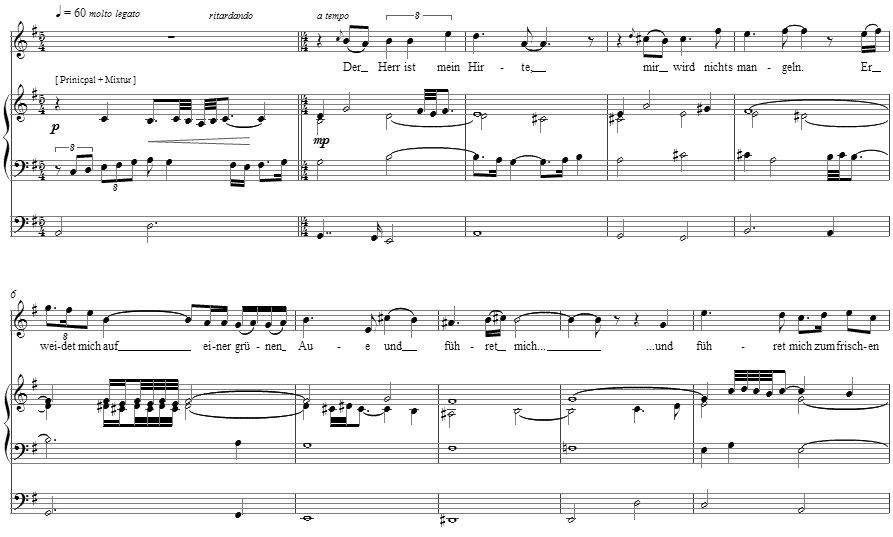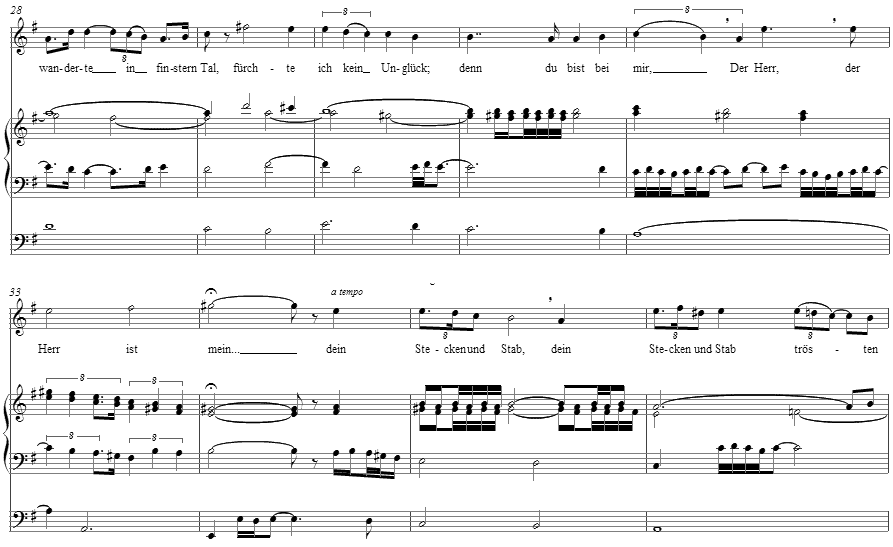Music and Texts of GARY BACHLUND Vocal Music | Piano | Organ | Chamber Music | Orchestral | Articles and Commentary | Poems and Stories | Miscellany | FAQs |
Der gute Hirte - (2002)

Psalm 23 in translation by Martin Luther
for high or medium voice and organ
1 EIN PSALM DAVIDS
Der HERR ist mein Hirte,
mir wird nichts mangeln.
2 Er weidet mich auf einer grünen Aue
und führet mich zum frischen Wasser.
3 Er erquicket meine Seele.
Er führet mich auf rechter Straße
um seines Namens willen.
4 Und ob ich schon wanderte im finstern Tal,
fürchte ich kein Unglück;
denn du bist bei mir,
dein Stecken und Stab trösten mich.
5 Du bereitest vor mir einen Tisch
im Angesicht meiner Feinde.
Du salbest mein Haupt mit Öl
und schenkest mir voll ein.
6 Gutes und Barmherzigkeit werden mir folgen mein Leben lang,
und ich werde bleiben im Hause des HERRN immerdar.[ 6 pages in organ score, circa 4' 30" ]
Martin Luther
Martin Luther (1483-1546) is credited with beginning the Protestant Reformation in 1517. Several Protestant denominations bear his name to this day as Lutheran. He was born at Eisleben, in Saxony, educated at Magedburg and Eisenach and received an Masters at Erfurt in 1505. After graduation he entered the monastery in Erfurt and was ordained as a Roman Catholic priest in 1507. The next year he was appointed to the faculty of the University of Wittenburg, where he lectured on the physics and dialectics of Aristotle.
Luther spent much of the year of 1510 in Rome where he witnessed what he saw as the corruption of the church. Upon his return from Rome, he compared the state of the Church with the practices and teachings in apostolic times. In 1512 he received his Doctor of Divinity degree and began to promote a more biblically oriented theology. On October 31, 1517, he nailed ninety-five theses on the door of the Wittenberg Castle Church denouncing the church's practice of selling indulgences, among other issues, and was subsequently called to Rome to answer his charges, but the University of Wittenberg prevented him from going.
He was branded a heretic by the church and an outlaw by several German states. Elector Frederick the Wise of Saxony protected him so that he was able to continue his reforming work. Because of Luther efforts, the bible was translated in to German and thereby brought into the homes of the people in their language. Luther wrote many new hymns of the Reformation himself, but used familiar folk songs, plainsongs and poetry. The Achtliederbuch has often been referred to as Luther's hymnal because it contained four of his hymns. Hymnals in which Luther's works appear -- besides the Etlich Cristlich lider Lobesang und Psalm 1523/1524 (Achtliederbuch) -- are the Enchiridia published in 1514, and Geystliche Lieder published in 1545. (Note the older German spellings of the time.)
His last years sullied his early work as he gave voice to anti-Jewish sentiments in published works and sermons only come to public awareness in the last decades, as denominations naming themselves as Lutherans after him have been forced to repudiate his late works and sentiments. Nonetheless his translation into German marks a substantial movement forward in the history of the German literary tapestry over time.
Tessitura for high voice
The musical setting is a set of extended harmonic sequences, making for musical verses within a larger structure in accordance with the simple plan below in which a series of voices lead to successive major chords outside the tonality thereby forcing continuing modulations.
The tonal plan allows the harmonic underpinning of the vocal line to continually drive it forward into and over more distant tonal regions.
At the height of the vocal range and fulcrum of the setting, there is a large restatement of the opening text after rising harmonic structures and more ornate voicing bring the setting our of G major and into E major, before its return to the home key.
The score of Der gute Hirte is available as a free PDF download, though any major commercial performance or recording of the work is prohibited without prior arrangement with the composer. Click on the graphics below for this score for voice and organ in either the high or medium keys.


